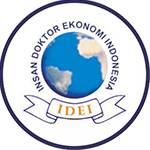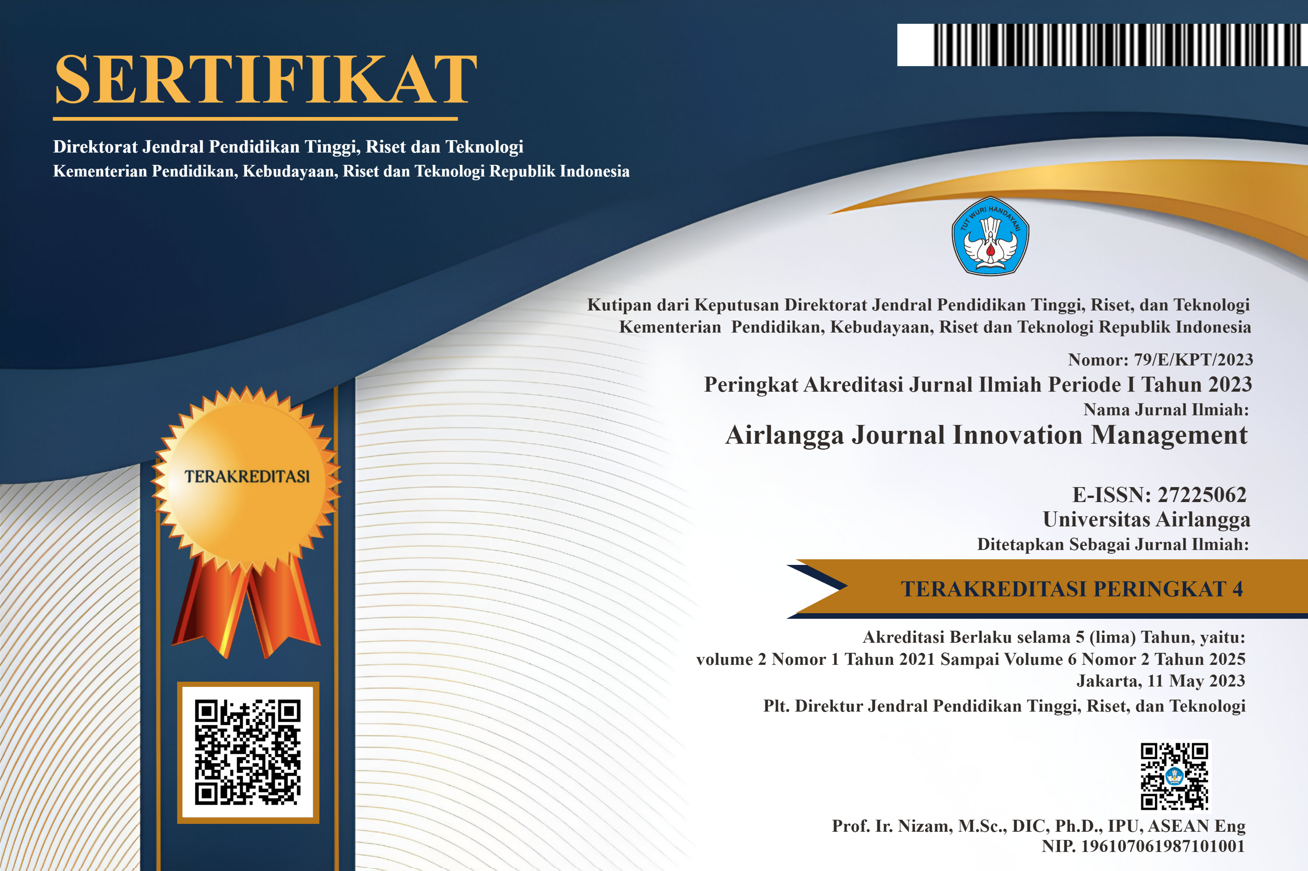Bahasa Inggris
Unduhan
Penelitian ini bertujuan untuk mengeksplorasi faktor-faktor yang memengaruhi niat beli konsumen di restoran berlabel halal, khususnya Generasi Milenial di Bogor. Dengan mengadopsi teori perilaku terencana (TPB) sebagai kerangka konseptual, penelitian ini menggunakan metode SEM-PLS melibatkan 222 responden dari Generasi Milenial di Bogor. Hasil penelitian menunjukkan bahwa variabel sikap dan label halal memiliki pengaruh signifikan terhadap minat beli konsumen di restoran halal, sementara variabel pengetahuan dan harga tidak memiliki pengaruh signifikan terhadap minat beli. Implikasi dari penelitian ini sangat relevan bagi pemilik dan praktisi industri restoran halal. Rekomendasi strategis melibatkan peningkatan informasi tentang kehalalan produk dan layanan, penguatan sertifikasi halal dan label, serta perhatian khusus terhadap faktor-faktor yang memengaruhi sikap konsumen. Restoran diharapkan mencari keseimbangan antara harga yang kompetitif dan layanan berkualitas tinggi. Dengan langkah-langkah ini, pemilik restoran dan praktisi pemasaran dapat meningkatkan daya tarik dan minat beli konsumen di restoran halal mereka, yang pada gilirannya akan memiliki dampak positif pada pertumbuhan bisnis mereka.
Aditami, S. (2016). The analysis of halal product purchase intention using Theory of Planned Behavior (TPB): An application on bakery product consumption (Doctoral dissertation, Universitas Muhammadiyah Surakarta).
Ahmed, S., & Rahman, M. H. (2015). The effects of marketing mix on consumer satisfaction: a literature review from Islamic perspectives. Turkish Journal of Islamic Economics, 2(1), 17-30.
Aikat, D. (2019). Millennials usher a post-digital era: Theorizing how generation Y engages with digital media. In Mediated Millennials (pp. 9-29). Emerald Publishing Limited.
Aisyah, M., Suzanawaty, L., & Said, M. (2019). The demand for halal-certified restaurants in Indonesia. International Journal of Supply Chain Management, 8(5), 86-98.
Aithal, A., & Aithal, P. S. (2020). Development and validation of survey questionnaire & experimental data–a systematical review-based statistical approach. International Journal of Management, Technology, and Social Sciences (IJMTS), 5(2), 233-251.
Ajzen, I. (1991). The theory of planned behavior. Organizational behavior and human decision processes, 50(2), 179-211.
Akhtar, N., Jin, S., Alvi, T. H., & Siddiqi, U. I. (2020). Conflicting halal attributes at halal restaurants and consumers' responses: The moderating role of religiosity. Journal of Hospitality and Tourism Management, 45, 499-510.
Al-Ansi, A., & Han, H. (2019). Role of halal-friendly destination performances, value, satisfaction, and trust in generating destination image and loyalty. Journal of destination marketing & management, 13, 51-60.
Al-Banna, H. (2019). Muslim customer behavior in halal food online purchasing. Journal of Islamic Monetary Economics and Finance, 5(3), 517-540.
Albattat, A., Ahmad Pitra, J., Mahendran, N. A. P., & Azmi, A. (2018). The impact of service quality on Muslim customers in Shariah compliant hotel. Journal of Tourism, Hospitality and Environment Management, 3(8), 1-14.
Amrullah, A. (2023). Determinants of Consumer Purchase Intentions on Halal Products. Airlangga Journal of Innovation Management, 4(1) 31-40 https://doi.org/10.20473/ajim.v4i1.46825
Aprilia, S., & Priantina, A. (2022). Analisa Strategi Peningkatan Sertifikasi Halal Sektor Kuliner Di Bangka Selatan. International Journal Mathla'ul Anwar of Halal Issues, 2(1), 50-71
Ariffin, S. K., Azra, W. F., Wahid, N. A., & Nee, G. Y. (2019). Investigating the factors affecting purchase intention of Muslim women towards halal cosmetics. Journal of Entrepreneurship, Business and Economics, 7(2s), 78-105.
Asnawi, N., Sukoco, B. M., & Fanani, M. A. (2018). Halal products consumption in international chain restaurants among global Moslem consumers. International Journal of Emerging Markets, 13(5), 1273-1290.
Aspan, H., Sipayung, I. M., Muharrami, A. P., & Ritonga, H. M. (2017). The Effect of Halal Label, Halal Awarness, Product Price, and Brand Image to the Purchasing Decision on Cosmetic Products (Case Study on Consumers of Sari Ayu Martha Tilaar in Binjai City). International Journal of Global Sustainability, 1(1), 55-66.
Azam, M. S. E., & Abdullah, M. A. (2020). Global halal industry: realities and opportunities. IJIBE (International Journal of Islamic Business Ethics), 5(1), 47-59.
Aziz, M. A. A. A., Bakar, M. F. A., Zaaba, M. K., & Hassan, F. (2019). The influence of theory of planned behavior, religion and halal certification on consumers' purchase intention of halal food at restaurant in subang jaya. In Contemporary Management and Science Issues in the Halal Industry: Proceedings of the International Malaysia Halal Conference (IMHALAL) (pp. 53-63). Springer Singapore.
Aziz, Y. A., & Chok, N. V. (2013). The role of Halal awareness, Halal certification, and marketing components in determining Halal purchase intention among non-Muslims in Malaysia: A structural equation modeling approach. Journal of International Food & Agribusiness Marketing, 25(1), 1-23.
Bashir, A. M. (2019). Effect of halal awareness, halal logo and attitude on foreign consumers' purchase intention. British Food Journal, 121(9), 1998-2015.
Bhutto, M. Y., Ertz, M., Soomro, Y. A., Khan, M. A. A., & Ali, W. (2023). Adoption of halal cosmetics: extending the theory of planned behavior with moderating role of halal literacy (evidence from Pakistan). Journal of Islamic Marketing, 14(6), 1488-1505.
Bucuta, A. (2015). A review of the specific characteristics of the generation Y consumer. In The Proceedings of the International Conference" Marketing-from Information to Decision" (p. 38). Babes Bolyai University.
Derahman, Z., Takrim, K. B., & Rahman, Y. A. (2018). Customers' intention to eat at halal certified restaurant using SEM PLS. Politeknik & Kolej Komuniti Journal of Social Sciences and Humanities, 2(1), 9-23.
Elasrag, H. (2016). Halal industry: Key challenges and opportunities.
Elseidi, R. I. (2018). Determinants of halal purchasing intentions: evidences from UK. Journal of Islamic Marketing, 9(1), 167-190.
Fahham, A. M. (2017). Tantangan pengembangan wisata halal di Nusa Tenggara Barat. Aspirasi: Jurnal Masalah-Masalah Sosial, 8(1), 65-79.
Hagger, M. S., Cheung, M. W. L., Ajzen, I., & Hamilton, K. (2022). Perceived behavioral control moderating effects in the theory of planned behavior: A meta-analysis. Health Psychology, 41(2), 155.
Haleem, A., Khan, M. I., Khan, S., & Jami, A. R. (2020). Research status in Halal: a review and bibliometric analysis. Modern Supply Chain Research and Applications, 2(1), 23-41.
Halimi, F. F., Gabarre, S., Rahi, S., Al-Gasawneh, J. A., & Ngah, A. H. (2022). Modelling Muslims' revisit intention of non-halal certified restaurants in Malaysia. Journal of Islamic Marketing, 13(11), 2437-2461.
Haro, A. (2016). Understanding TPB model, availability, and information on consumer purchase intention for halal food. International Journal of Business and Commerce, 5(8), 47-56.
Hashim, A. J. C. M., & Musa, R. (2013). Modeling the effects on the attitude of young adult urban Muslim women towards halal cosmetic products: new insights for championing the halal economy. International Journal of Education and Research.
Hasyim, F., & Purnasari, N. (2021). Antecedent Of Halal Food Purchasing Decision: A Theory Of Planned Behavior (TPB) Approach. IQTISHADIA, 14(1), 107-124.
Hidayat, A. S., & Siradj, M. (2015). Sertifikasi halal dan sertifikasi non halal pada produk pangan industri. AHKAM: Jurnal Ilmu Syariah, 15(2).
Izza, N. N. (2022). Bibliometric Mapping of Halal Fashion Research Development With Scopus Index. Journal of Islamic Economic Literatures, 3(2).
Izza, N. N. ., & Akbar, N. . (2023). Uncovering Halal Label Food Purchase Intention Behavior in Indonesia: A Twitter Analytics and SEM-Based Investigation . Jurnal Ekonomi Syariah Teori Dan Terapan, 10(6), 551–570. https://doi.org/10.20473/vol10iss20236pp551-570
Kasdi, A., Farida, U., & Cahyadi, I. F. (2019). Wali city branding: Marketing strategy in promoting halal tourism destinations Demak Indonesia. Geo Journal of Tourism and Geosites, 25(2), 463-473.
Katuk, N., Ku-Mahamud, K. R., Kayat, K., Abdul Hamid, M. N., Zakaria, N. H., & Purbasari, A. (2021). Halal certification for tourism marketing: the attributes and attitudes of food operators in Indonesia. Journal of Islamic Marketing, 12(5), 1043-1062.
Khan, M. I., & Haleem, A. (2016). Understanding "halal” and "halal certification & accreditation system”-a brief review. Saudi Journal of Business and Management Studies, 1(1), 32-42.
Khan, N., Sarwar, A., & Tan, B. C. (2021). Determinants of purchase intention of halal cosmetic products among Generation Y consumers. Journal of Islamic Marketing, 12(8), 1461-1476.
Khibran, M. (2019). An investigation toward purchase intention of halal beef from traditional market: A TPB perspective. Asian Journal of Islamic Management (AJIM), 1-12.
Latimer, A. E., & Martin Ginis, K. A. (2005). The importance of subjective norms for people who care what others think of them. Psychology & Health, 20(1), 53-62.
Ma'azzah, N., and Prasetyo, A. (2023). The Influence of Brand Image on Customer Loyalty through Customer Satisfaction as Intervening Variable on Skincare Products. Airlangga Journal of Innovation Management, 4(2), 219-228. https://doi.org/10.20473/ajim.v4i2.50401
Mardoni, Y., Hadziq, F., & Amsal, A. A. (2020, May). Predicting Intention of Halal Product Usage Among Food Seller Using Theory of Planned Behavior. In 2nd International Seminar on Business, Economics, Social Science and Technology (ISBEST 2019) (pp. 77-82). Atlantis Press.
Marmaya, N. H., Zakaria, Z., & Mohd Desa, M. N. (2019). Gen Y consumers' intention to purchase halal food in Malaysia: a PLS-SEM approach. Journal of Islamic Marketing, 10(3), 1003-1014.
Memon, Y. J., Azhar, S. M., Haque, R., & Bhutto, N. A. (2020). Religiosity as a moderator between theory of planned behavior and halal purchase intention. Journal of Islamic Marketing, 11(6), 1821-1836.
Mohamed, Z., Shamsudin, M. N., & Rezai, G. (2013). The effect of possessing information about halal logo on consumer confidence in Malaysia. Journal of International Food & Agribusiness Marketing, 25(sup1), 73-86.
Mohd Yunus, N. S., Raja Yusof, R. N., & Hashim, H. (2019). Predicting Muslim consumers' purchase intention of previously retracted and recertified halal products. Journal of Emerging Economies and Islamic Research, 7(1), 1-10.
Mutmainah, S., Romadhon, M.R. (2023). Influence of Halal Lifestyle, Islamic Branding and Social Media Marketing on Muslim Fashion Purchasing Decisions. Airlangga Journal of Innovation Management, 4(2), 158-171. https://doi.org/10.20473/ajim.v4i2.49714
Ngah, A. H., Gabarre, S., Han, H., Rahi, S., Al-Gasawneh, J. A., & Park, S. H. (2021). Intention to purchase halal cosmetics: do males and females differ? A multigroup analysis. Cosmetics, 8(1), 19.
Ningtyas, Y., FITRIA, D., PRADANI, Y. S., ARUM, N. P., & LU'LUUL, M. A. K. N. U. N. (2021). Analisis pengaruh sikap, norma subjektif, dan persepsi kontrol perilaku terhadap minat beli konsumen pada produk bersertifikat halal. Jurnal Ekonomi, Sosial & Humaniora, 2(08), 42-49.
Nurzulain, Z., Zuraini, M. I., Norhidayah, A., & AFIQ, M. M. (2019). Psychometric evaluation of purchase intention and actual purchase behaviour towards halal bakery products using Rasch analysis. Malaysian Applied Biology, 48(2), 19-25.
Xiuting, L. (2018). Factors Affecting Chinese Citizens' Purchase Intention Toward Halal Restaurant (Doctoral dissertation, President University).
Hak Cipta (c) 2024 Airlangga Journal of Innovation Management

Artikel ini berlisensiCreative Commons Attribution-NonCommercial-ShareAlike 4.0 International License.
- The journal allows authors to hold copyright without restrictions and retain publication rights without restrictions. The author retains the copyright and grants the first publication rights to the journal, with his work simultaneously licensed under the Creative Commons Attribution-NonCommercial-ShareAlike 4.0 International License (CC BY-NC-SA). This license allows others to share the work with acknowledgment of authorship and initial publication in this journal, provided that the work is not used for commercial purposes and that any derivative works must use the same license.
- Authors may enter into additional contractual agreements for non-exclusive distribution of the journal publication version (e.g., uploading it to an institutional repository or publishing it in book form), while still including acknowledgment of the initial publication in this journal.
- Authors are allowed and encouraged to upload their work online (e.g., in an institutional repository or personal website) before and during the submission process. This can support productive scientific exchanges as well as increase citations to published works.

AJIM by UNAIR is licensed under a Creative Commons Attribution-NonCommercial-ShareAlike 4.0 International License.





















